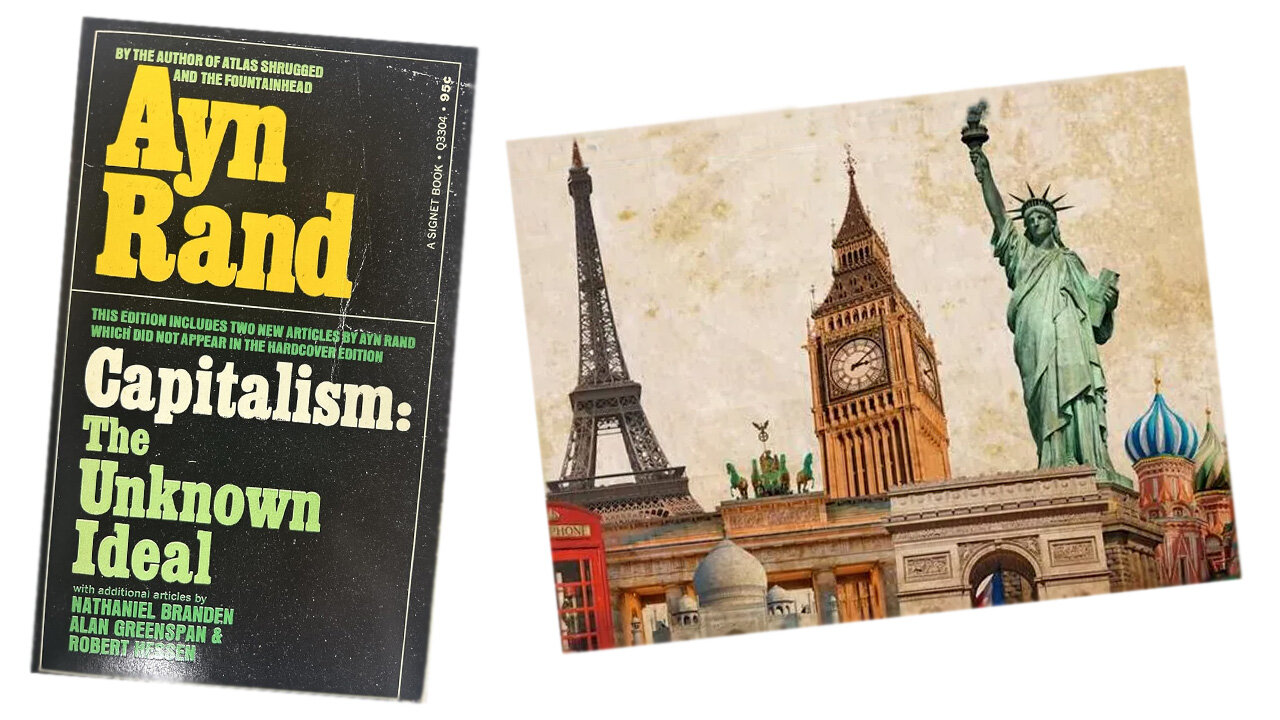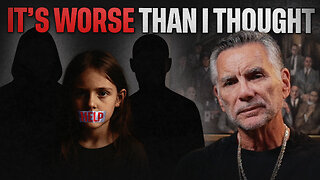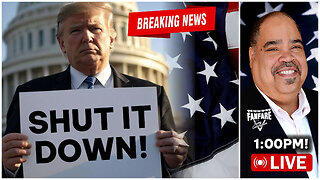Premium Only Content

'Capitalism: The Unknown Ideal' (1966) by Ayn Rand
Ayn Rand’s, 'Capitalism: The Unknown Ideal', first published in 1966, is a provocative and unapologetic defense of laissez-faire capitalism as not merely an economic system, but as a moral ideal. The book—part polemic, part philosophical treatise—brings together a series of essays by Rand, with contributions from her intellectual allies Nathaniel Branden, Alan Greenspan, and Robert Hessen. Together, they present an integrated vision of capitalism as the only system that recognizes and protects individual rights, driven not by the “public good” but by rational self-interest.
From the outset, Rand distinguishes her conception of capitalism from its common caricatures. For her, capitalism is not about corporate greed, cronyism, or unchecked exploitation. Rather, it is a system rooted in individual liberty, voluntary exchange, and objective law—a political expression of her broader philosophy, Objectivism. In the title essay, Rand argues that capitalism has never been fully implemented and remains misunderstood, vilified for the failures of mixed economies that only masquerade as free markets. Thus, it is “the unknown ideal.”
What sets the book apart is its moral foundation. Rand doesn't primarily defend capitalism on the grounds of efficiency, innovation, or even prosperity—though she claims it delivers all three. Instead, she anchors her argument in ethics: capitalism is right because it is just. It respects man’s nature as a rational being and upholds the principle that no man may initiate force against another. Government, under true capitalism, has only one role: the protection of individual rights through the police, the military, and the courts. Anything beyond that—welfare programs, economic regulations, social engineering—is an encroachment on freedom.
Rand’s essays are bracing in tone, intellectually rigorous, and often confrontational. In “What Is Capitalism?” she dismantles the notion that economics is a realm distinct from morality. In “The Roots of War,” she provocatively argues that statism, not capitalism, leads to conflict. And in “The Property Status of Airwaves,” she defends the privatization of even seemingly public domains. Her logic is unflinching and her prose characteristically sharp, brooking no compromise with those who would attempt to “balance” freedom with government control.
The book also features contributions from others who attempt to apply Rand’s principles to real-world policies. Nathaniel Branden explores the psychological appeal of collectivism, Alan Greenspan (years before chairing the Federal Reserve) critiques antitrust laws and inflationary policy, and Robert Hessen defends big business. These essays are uneven in style and impact, but collectively they reinforce the book’s central theme: government intervention distorts markets and violates individual rights.
However, 'Capitalism: The Unknown Ideal' is not without its blind spots and shortcomings. Rand’s ideological purity, while invigorating to some, can come off as absolutist and dismissive. Her lack of historical nuance is especially noticeable when she brushes aside concerns about wealth inequality, labor exploitation, and monopolistic behavior—not as flaws of capitalism, but as consequences of its betrayal. Critics argue that her vision of capitalism is so idealized it borders on utopian, ironically echoing the very ideologies she denounces.
Furthermore, the book assumes a level of philosophical alignment with Objectivism that may alienate newcomers. Without a prior understanding of Rand’s ethics and epistemology, some arguments—especially those rooted in her concept of “rational self-interest”—may seem either dogmatic or circular. And while Rand’s moral defense of capitalism is compelling in its coherence, it offers little to those who see systemic injustice not as a result of government overreach, but as intrinsic to unchecked market forces.
Despite these critiques, 'Capitalism: The Unknown Ideal' remains one of the most forceful defenses of free markets in 20th-century political thought. Its contribution lies not in economics per se, but in the moral re-framing of capitalism: not as a necessary evil or a utilitarian arrangement, but as the highest expression of human freedom and dignity. Whether one agrees with Rand or not, the book challenges readers to think deeply about the ethical foundations of political and economic systems.
In sum, 'Capitalism: The Unknown Ideal' is a bold, unrelenting, and deeply philosophical manifesto that reasserts the moral legitimacy of a system often condemned or misunderstood. For admirers of Rand, it is a principled blueprint for a free society. For critics, it is a provocative—and at times infuriating—testament to the enduring power of radical ideas. Either way, it demands attention.
-
 LIVE
LIVE
Kim Iversen
2 hours agoHegseth Summons Top Brass — Is War With Russia Incoming?
1,129 watching -
 1:31:41
1:31:41
Redacted News
2 hours agoNew Charlie Kirk Video Evidence Could Change EVERYTHING | Redacted w Natali & Clayton Morris
141K99 -
 1:54:22
1:54:22
vivafrei
3 hours agoOstrich Farm UPDATE! And Live with Tyler Fischer Talking REAL Cancel Culture He is Experiencing!
154K18 -
 31:39
31:39
Michael Franzese
1 hour agoAmerica’s Human Trafficking Crisis EXPOSED by Former Mobster
9.4K4 -
 LIVE
LIVE
Barry Cunningham
5 hours agoPRESIDENT TRUMP NEEDS TO STAND FIRM AND SHUT THE GOVERNMENT DOWN IF HE HAS TO!
1,126 watching -
 23:45
23:45
IsaacButterfield
12 hours ago $0.41 earnedThe Rise of Autism in Gen Z
7.61K11 -
 LIVE
LIVE
LFA TV
1 day agoBREAKING NEWS ALL DAY! | THURSDAY 9/25/25
1,288 watching -
 1:59:20
1:59:20
The Quartering
7 hours agoCharlie Kirk Conspiracies Go TOO FAR, Youtube Re-Bans Everyone & Libs Dying From Tylenol
152K85 -
 DVR
DVR
The Trish Regan Show
3 hours agoTrump SUES Disney Over Kimmel’s Return to ABC! Disney CEO, Kimmel BOTH OUT!?!
22.6K5 -
 1:07:22
1:07:22
Dr. Drew
5 hours agoTargeted: Political Violence Began Long Before Charlie Kirk's Assassination – Leftist Influencers Like Hasan Piker Are Making It Worse w/ Dave Rubin & Jack Posobiec – Ask Dr. Drew
27.1K1